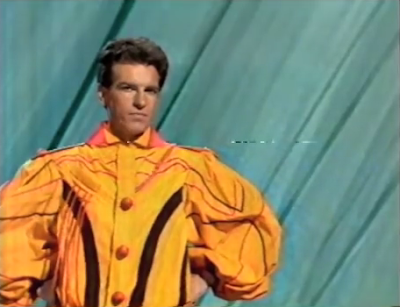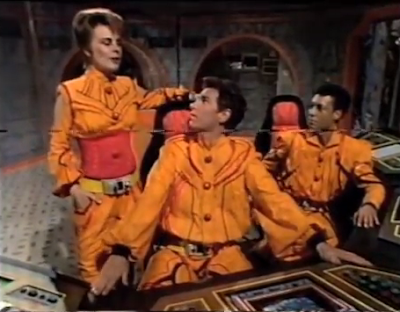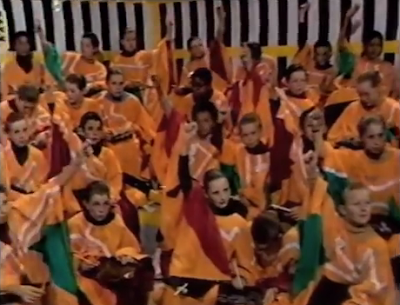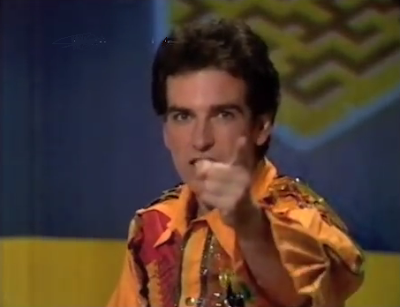Stay Alert!
You’d probably need some sort of Space Detective to work out exactly what started off the early eighties trend for ‘intelligent sci-fi’. But whatever it was, even the most amateur of Space Detectives could prove beyond all reasonable doubt that it made for something of a renaissance of the genre and some top notch books, films, television and radio shows. On the BBC alone you got, amongst others, The Hitch-Hiker’s Guide To The Galaxy, The Day Of The Triffids, Peter Davison-era Doctor Who, Blake’s 7, Radio 4’s Earthsearch, and even a couple of children’s game shows, both of which which are remembered far better than any children’s game show of the time has any right to be. And neither of which was Cheggers Plays Pop.
The Adventure Game, a Hitch-Hiker's-inspired series of logic puzzles designed to fox the combined intellect of Stilgoe’n’Craven-heavy teams of Children’s BBC-friendly celebrity contestants, is rightly and roundly celebrated anywhere you might care to look. But not so the equally fondly-recalled Captain Zep – Space Detective. But who was this Captain Zep? How did he come to attain the coveted rank of ‘Space Detective’? And what does all this have to do with Ernie Wise, cash-strapped punk rockers and a semi-naked Glynis Barber? Well, to find out, we’ll have to go to another time, another place, where the clues are indeed there for you to trace…
Captain Zep – Space Detective ran for two series and twelve episodes on BBC1 between 1983 and 1984, featuring quizzes based on crimes from the casebook of the crew of Zep One, the flagship of the 21st Century’s Space Office of Law Verification and Enquiry – or S.O.L.V.E. for short. Each episode would see Captain Zep and his two assistants relate one of their past cases to an audience of youngsters sporting slicked-back hair and cumbersome orange jumpsuits; said youngsters were invited to pick up clues from the action and, following a couple of leading questions from the Captain (“So… who was the saboteur? Why was Grazarax in the Munitions Bay?"), offer their own conclusions on who the intergalactic culprits were, scribbling their answers down on a neon pink ‘magic slate’. Once the successful had been congratulated and the unsuccessful commiserated, the Captain addressed the audience at home with an additional poser about the case, inviting them to write in with their answer and, just possibly, win a S.O.L.V.E. badge of their very own.
All very ordinary sounding and indeed semi-educational sounding, but what really made Captain Zep – Space Detective stand out was that it looked like a 2000 AD strip come to life. Literally, in fact, as the archived cases of the Captain and company were achieved by superimposing the actors into a series of crudely animated futuristic watercolours of aliens, spaceships and landscapes; many of these were the work of Trevor Goring, a rising star of the comics world who would later become better known for his work on the official Torchwood strip and the feature film version of Watchmen. For such a simple idea, the effect was surprisingly well-rendered, and it’s probably no coincidence that this same technique had very recently been used for Jane, BBC2’s Glynis Barber-starring adaptation of the exploits of the thirties comic strip heroine with a penchant for losing her clothes. As coincidence would have it, one of the artists working on Jane was Paul Birkbeck, who also contributed to Captain Zep - Space Detective and - in an apparent bid to dominate the mid-eighties BBC by sheer will of pencil alone - was also responsible for the sketches seen in the titles of Miss Marple.
Perhaps surprisingly, Captain Zep - Space Detective was created by veteran gagsmith Dick Hills. With his writing partner Sid Green, American-born Hills had been a highly sought-after writer for post-war comedians, with their engagements including a long stint providing sketches for Eric Morecambe and Ernie Wise (which also saw them script the duo's three sixties feature films), and contributing to Anthony Newley's notorious absurdist sitcom The Strange World Of Gurney Slade. He would later spend part of the seventies in America, working with the likes of George Carlin, Richard Pryor and Flip Wilson, and by the time of Captain Zep - Space Detective he was busy churning out topical one-liners for the likes of Rory Bremner and Jasper Carrott. Hills would write all six episodes of the first series, which saw the Captain recall his investigations into Death On Delos, The Lodestone Of Synope, The Plague Of Santos, The G&R 147 Factor, The Tinmen Of Coza and The Warlords Of Armagiddea.
Captain Zep was portrayed by Paul Greenwood, already well-known to viewers as the long-suffering PC 'Rosie' Penrose in a series of sitcoms penned by Roy Clarke, with Ben Ellison as disconcertingly naïve second-in-command Jason Brown, and Harriet Keevil as the more forensically-minded Professor Spiro. Unusually for a series of this nature, the three had a clearly-defined and often antagonistic relationship with each other, and also a fair amount of comic dialogue. They also had three of the bulkiest costumes ever seen on television, which were doubtless very uncomfortable under hot studio lights, with Keevil’s gaining unwitting iconic status amongst adolescent males of a certain generation due to its elaborate stylised bust-adornments.
Not everything about Captain Zep - Space Detective was quite so futuristic. Firmly rooted in the here and now - though, it has to be said, light years ahead of much of the BBC's children's output of the time - was the synth-heavy New Wave-styled theme song, complete with suitably clumsy rhymes like “help me help me if you can/Space Investigator Man/across the stars he’s on his way/it’s Captain Zep to save the day!”, which were delivered in a suspiciously proto-Blur vocal style. If you're thinking this sounds like the work of a long-forgotten second-wave New Wave outfit of the sort that used to crop up on Cheggers Plays Pop all the time, that's because it was the work of a long-forgotten secong-wave New Wave outfit of the sort that used to crop up on Cheggers Plays Pop all the time. A rare punk signing to EMI's predominantly prog-rock imprint Harvest, The Banned had enjoyed a couple of hits at the turn of the eighties with covers of relatively obscure sixties psych-punk numbers like Little Girl and Him Or Me. After the hits had dried up, various members had taken to recording music for use in films and TV shows, which including the BBC's long-running children's art magazine show Take Hart.
It was this association that led to them being commissioned to record the Captain Zep - Space Detective theme song, which sufficiently popular to be released as a single by BBC Records And Tapes during the first series. Credited to 'The Spacewalkers' and backed by the unrelated instrumental groover A Race Against Time, this was, along with a little-seen puzzle book, the only official (and, let's face it, basically the only) item of merchandise related to the series. However, obsessive Captain Zep collectors should note that the theme also appeared on the album BBC Children's TV Themes in 1984 (also home to the Peter Howell arrangement of Doctor Who and the full-length theme song from legendarily outlandish Japanese import Monkey, as well as numerous other delights from shows aimed at a younger audience, which is why it fetches a fair amount second hand now), while Dick Mills' effects from the 'Armagidden War Games' appeared as a track on the BBC Radiophonic Workshop album The Soundhouse, while an earlier self-titled Radiophonic Workshop collection included Mills' Adagio, which was used as backing atmospherics in the S.O.L.V.E. Academy sequences.
Broadcast early in 1983, Captain Zep – Space Detective was a hit with its intended audience and with sci-fi fans desperate for something to fill the long gap between series of Doctor Who, and a second run was commissioned for early the following year. Paul Greenwood, however, was unavailable, due to commitments for Thames TV's upcoming adaptation of The Secret Diary Of Adrian Mole Aged 13 3/4, so he was replaced as Captain Zep – now revealed to be a title bestowed on the captain of Zep One – by Richard Morant. This was an unusual departure for an actor who was almost exclusively known for heavyweight costume dramas, though in fairness the role did require him to tackle heavyweight costumes of an altogether different kind. Harriet Keevil was also replaced by Tracey Childs as Professor Vana, while Dick Hills handed the writing duties over to Colin Bennett. One of the more eccentric figures in the dramatic arts, classically-trained Bennett was well-known to younger viewers of the BBC for playing a comedy janitor of the same name in the long-running Tony Hart-fronted art show Take Hart, and while working on Captain Zep – Space Detective he was also hard at work scripting the equally futuristic juvenile sitcom Luna for ITV. Subsequent career moves have seen him do everything from direct stage musicals to presenting the legendary off-the-cuff ITV nighttime documentary series Night Shift, placing him in the unusual position of having writing the scripts for Death Under The Sea, The Missing Agent Of Ceres, The Small Planet Of Secrets, The Sands Of Sauria, The Tree Of Life and Death By Design appear as one of the more conventional entries on his CV.
Sadly, this was to be the final outing for Captain Zep – Space Detective. Although popular, it was also one of the most expensive series produced by the Children’s Department at that time, and when they were forced to make cuts to help accommodate the forthcoming launch of a BBC daytime service, it was unsurprisingly one of the first to be axed. Hapless viewers could only turn to Starstrider, ITV’s attempt to fill the void with a rather aimless sci-fi quiz fronted by Sylvester McCoy. While Ben Ellison was rarely seen on TV afterwards, Paul Greenwood, Richard Morant and Harriet Keevil still often show up in guest roles, usually in Midsomer Murders, while Tracey Childs went on to spend several years as one of the stars of the BBC's yacht-boardroom drama Howard's Way.
As for Captain Zep – Space Detective itself, as fondly remembered as it might be, there’s no sign of even a DVD release, let alone any kind of revival. We can only hope that, somewhere, the punkily-heralded ‘Man of Steel, Man of Nerve’ is looking for clues to his own mysterious cancellation in front of a giant comic strip rendering of Michael Grade’s face.
An earlier version of this feature originally appeared in in This Way Up magazine. You can find more about the single release of the Captain Zep - Space Detective theme in Top Of The Box, my book about BBC Records And Tapes, and more about weird, wonderful and mundane forgotten TV shows in Well At Least It's Free, Not On Your Telly and The Camberwick Green Procrastination Society.







